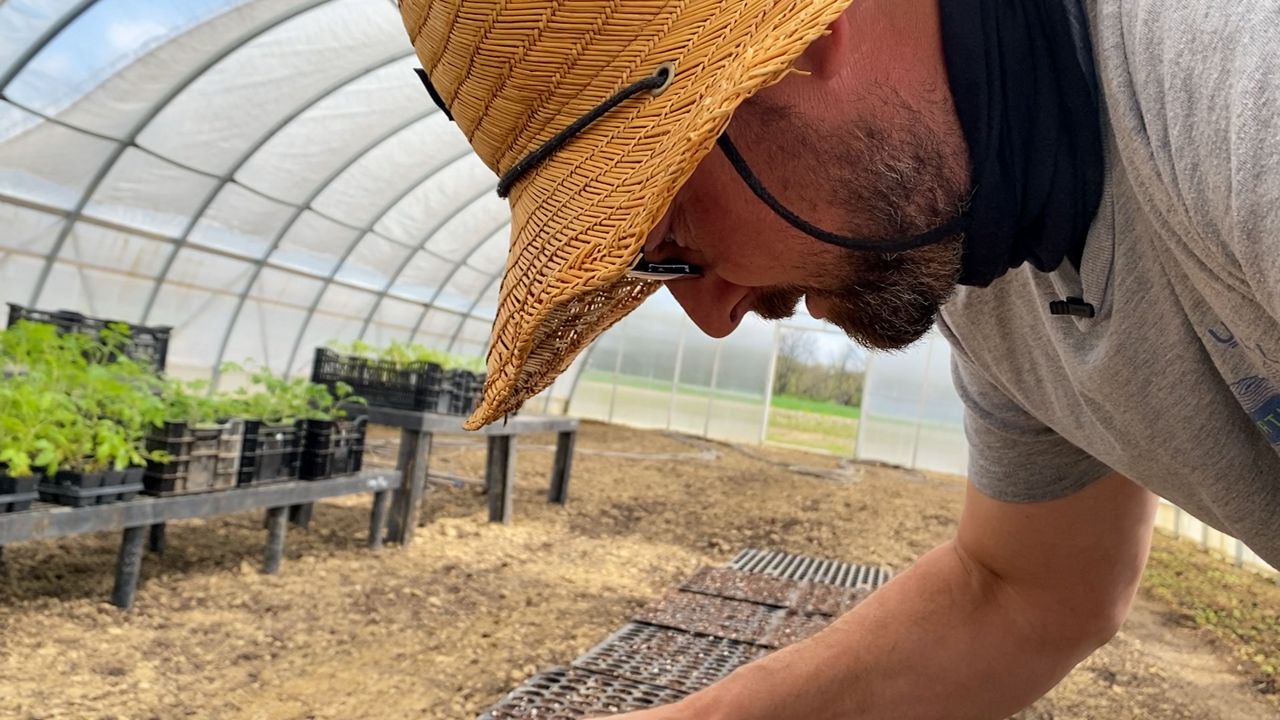
As the state sees its final few frosts, the buds sprouting in Nick Hice’s greenhouse are yearning to take root in his sprawling Warren County fields.
Every day, the hundreds of tiny tufts of green Hice is cultivating grow a little taller, a little stronger and by the fall, he hopes they’ll make a fruitful harvest. His second Ohio-grown hemp crop.
What You Need To Know
2020 was the first year Ohio farmers could plant hemp Hemp must have less than 0.3 percent THC to be legally harvested If hemp exceeds the threshold it must be destroyed 191 farmers were a part of the state’s first cropWhile Hice only bought his farm, Natural Horticulture, a few years ago, he’s not new to planting or new to Warren County.
“I actually grew up about 10 miles down the road from here and my family had a garden center,” he said.
Hice, however, planned to go into business, managing that side of the family business until he started to feed a budding interest in a new kind of agriculture.
“In 2009, we moved out to Colorado and shortly after that I had an opportunity to grow cannabis for one of the regulated operators out there,” he said.
Hice said he spent a decade in Colorado growing some of the state’s first legal crops of high THC cannabis.
Then when the 2018 farm bill passed, he thought it was time for a homecoming.
“I actually specifically moved back here to grow hemp in 2020,” he said.
It’s was the first year farmers legally could grow hemp in Ohio.
Hemp is a species of the cannabis plant but contains low amounts of THC, the chemical responsible for the “high” sensation for marijuana users.
Federally, THC remains illegal though some states have their own laws relating to the plant. Across the county, processors can instead use hemp to make legal CBD products.
“As regulated as hemp is it’s not nearly as regulated as high THC cannabis is,” Hice said.
The strictest rule for hemp farmers is that their crop must be tested before it's harvested to ensure it falls below the federal threshold for THC, 0.3%. If the crop fails, farmers can request one more test, otherwise, they must destroy the crop.
With that in mind, Hice applied to grow hemp in the state and the Department of Agriculture gave him the approval and along with 191 other farmers, he planted his first crop: two types of hemp planted across five acres.
Last fall, he sent a sample of each off to the state lab and waited anxiously for his results.
“Both passed the THC testing last year but they were right at the threshold,” he said.
Not every farmer was so lucky.
Last fall, the agriculture department had 20 samples exceed the 0.3% limit. They retested six of them and three passed the second test, but a handful of farmers lost everything.
“That’s not fun to hear about and it’s not fun to think about,” Hice said.
This year, Hice is hoping he can avoid that fate and give himself a little more wiggle room by harvesting a little earlier.
He also acknowledges that these risks and regulations are among the reasons hemp is not the only thing he plants.
Hice also grows high-yield produce like lettuce, carrots, peppers and zucchini.
“We’re flexible depending on what market develops more quickly,” he said.
Hice said the crops can both get their start in greenhouses until it's warm enough to plant them in the spring and once in the field he uses a lot of the same equipment to care for and harvest them.
“It gives us that diversification and allows us to have some cash flow and some income while we’re waiting on that larger hemp crop to come in,” he said.
While neither field is the official money-maker at his farm, Hice said growing hemp is definitely closer to his heart. That’s the plant he spent years researching and growing for others so he said bagging his first batch of hemp on his own farm was its own reward.
“It’s really unfortunate that farmers haven’t had that opportunity to grow it for all these years so it was really exciting for us to move back to be part of one of the first crops,” he said.
Hice hopes regulations ease over the next couple of years as public perception around cannabis changes but for now, he said his advice to farmers is to remain cautious and flexible. The market is still new and so is the product, but he believes his experience in Colorado shows there is a way to make a living in this new industry.
